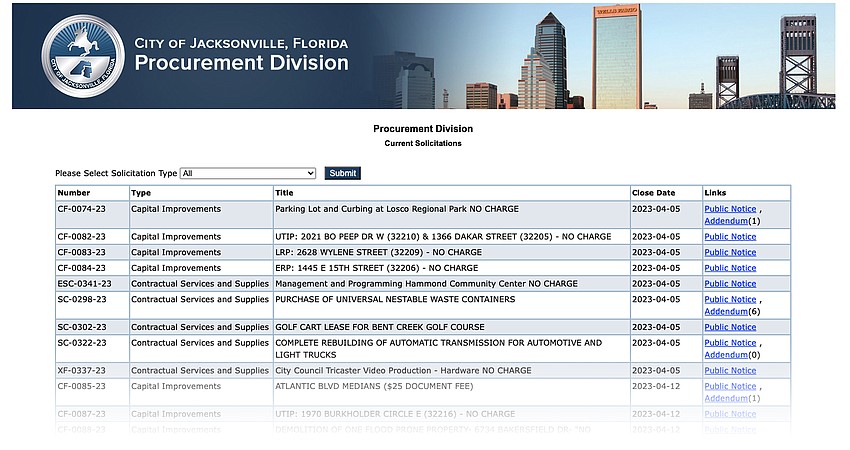
The City Council Auditor’s Office wants to know whether Mayor Lenny Curry’s administration has conducted a state statute-required cost analysis for its effort to allow legal notices to be pulled from local newspapers in favor of publishing on a city-controlled website.
The auditor’s question topped a list of unknowns in an email exchange March 17 and March 24 with city Deputy Chief Administrative Officer Charles Moreland while preparing its report on Ordinance 2022-0187 filed with Council by Curry.

The Daily Record acquired the email thread March 31 through a public records request.
Curry’s bill says the city has established a publicly accessible website that will cost less to use to publish legally required advertisements and public notices and is less than using local newspapers.
Proving it costs less is required by Florida House Bill 7049, approved by the state Legislature in 2022, which allows cities and counties to operate “publicly accessible websites” for notices and legal ads.
If approved by Council, the ordinance would change the way the city has published notices including bids for contract services; public meetings; zoning; land use and tax changes; and building variances in Jacksonville for more than a century.
In his March 17 response to whether the cost analysis was complete, Moreland provided the auditor’s office with a spreadsheet showing what the city spends annually with the Daily Record and The Florida Times-Union.
Those are the newspapers that publish public notices in Duval County for the city.
Moreland told Council auditors in his email response, “Simply stated, existing resources can be utilized at no additional cost to taxpayers” to publish notices on a government website.
According to the email thread, the city will not build a stand-alone website for legal advertisements and it will be embedded in coj.net using its existing content management software.
Moreland used the interface used for city solicitations published on the Procurement Division’s webpage as an example.
“The requirements for public notices did not lend itself to building a new standalone software application from the ground up, which would have incurred reoccurring maintenance costs,” Moreland wrote.
“Since coj.net contains hundreds of public-facing pages, there is not a specific cost associated with each page or site, rather, upgrades and maintenance (are) performed holistically across the entire software platform,” he wrote.

In a follow-up email March 24, the auditor’s office asked whether the purchase order summary for the city’s newspaper advertising expenses meet the cost analysis required in the Florida statute.
According to Council Auditor Kim Taylor, as of April 4, the Curry administration had not answered whether it has documented the city’s estimated cost for posting legal notices; reviewing the posted notices to ensure they meet legal compliance; maintenance and oversight of the city’s website; and creating a registry of mail/email notice recipients.
Moreland had a similar response March 16 to the Daily Record’s records request for a cost comparison analysis.
When asked to clarify whether the administration had an analysis in writing showing estimated personnel time, overhead and website maintenance costs, city Director of Public Affairs Katie Wiles replied with the following statement:
“Our IT (staff) has confirmed there is no cost associated to bringing this in-house and integrating (it) into an already functioning system. So, there is no need to do a cost analysis if there is no cost associated.”
The city legislation puts its Information Technology Division in charge of maintaining the website.
A bill summary created after the ordinance was filed cites a “nominal cost for public notice website maintenance on the city webpage” but does not give an exact figure.
Moreland told the auditor’s office that the Curry administration’s financial analysis does not include the cost of maintaining a registry of people who have requested to receive notices by first-class mail and fulfilled those requests required by Florida law.
The Florida Press Association and the state’s newspaper industry have been fighting the push for cities and counties to remove public notices from newspapers in favor of government websites for years and are and monitoring the pace of the transition.
FPA President and CEO Jim Fogler said in a March 24 email that it’s still unclear how much the first-class mail provision will cost cities.
“There’s still a lot of unknowns including the cost of first-class mail which could cost more than what it would cost to run in a newspaper,” Fogler said.
“(FPA is) not sure how many counties have answered that question yet or the liability question.”
Most public notices can already be found online. In addition to many newspaper websites in Florida, the FPA hosts a free website, FloridaPublicNotices.com, where all legal notices published in newspapers are uploaded, archived and searchable.
Costs for that website are absorbed by FPA member newspapers, Fogler said
“One big downside of the county-website option is that it does not require uploading to floridapublicnotices.com site, which will make it harder for citizens to find the notices,” he said.
Less expensive?
The spreadsheet Moreland provided the auditor’s office and Daily Record says the city paid the Jacksonville Daily Record and the Times-Union a total of $166,823 for legal advertising in 2022.
The Daily Record has published legal notices in Duval County since the newspaper’s inception in 1912 and is paid for that service.

Angela Campbell, the newspaper’s publisher, estimated in a March 30 editorial that labor; materials; postage based on 1% of households in Duval County requesting notices by first-class mail; and liability costs brought by private parties impacted by noticing mistakes, could cost the city $375,440.
In addition to posting city legal notices, the Daily Record is the official newspaper of the Duval Circuit and County courts; the U.S. Bankruptcy Court for the Middle District of Florida; and the Jacksonville Bar Association.
Curry’s intent
City Chief Administrative Officer Brian Hughes told the Daily Record on March 13 that the intent of the bill is to give the city the option to publish all public notices online.

Hughes said that the legislation was “meant to offer it as a replacement for anything that we do in the public notice realm.”
One of the Council Auditor’s March 24 questions appears to suggest the city Office of General Counsel could file an amendment to clarify that the Curry administration’s intent with the bill is to have the option to publish all city legal notices in-house, not only the specific types of notices outlined in the bill.
The legislation is written so city department heads have the option to publish notices in newspapers or the city website, but doesn’t make it mandatory.
“If you look at the way we’ve crafted the bill, it’s not a mandate. We don’t have ‘you must’ ... do this. But we wanted it as a resource,” Hughes said.
“If that department director says, there’s a compelling case for this one to go the traditional way rather than online, it offers the avenue to do that,” he said.
But it’s unclear how often city officials would choose print.
In addition to expense, Hughes said the city wants the ability to post notices immediately and not wait for print publication deadlines to make procurement and other city contract functions faster.
Hughes said the Curry administration is prepared to tell Council members it’s “ready to flip the switch” on the city public notice online portal.
What’s next
Before it heads to Council committees for debate next week, the Jacksonville Planning Commission is scheduled to make a recommendation on the legislation at its April 6 meeting.
Planning and Development Department staff have recommended approval, according to a staff report issued for the meeting.
Council President Terrance Freeman introduced the bill at Curry’s request at Council’s March 14 meeting.
After it is heard by the Planning Commission, the ordinance will have a public hearing at the April 11 Council meeting.
It would next head to the Council Rules, Finance and Land Use and Zoning committees for an initial vote April 17 and 18, respectively.
If approved, it could be back before the full Council for a final vote April 25.